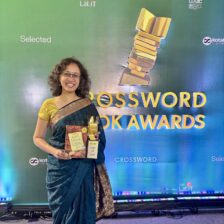My online creative writing programme served as the perfect excuse to get a copy of How to Be a Writer. And as I read it, every few lines, I found myself thinking, “This, exactly this!” For the first time, I highlighted sections all over the book (ebook, not physical book, just saying) simply because so much of it resonated with me. In some places, I was drawn to the words as a writer; in others, as a teacher of creative writing.
Instead of my usual kind of review, I’m going to share tiny excerpts of the book.
If I talk too freely about a story I am going to write, chances are it will never be written. I have talked it to death.
This is me! I can never, ever talk about my current works in progress. I used to think it was superstitious nonsense, but I realise that what Bond says above is true for me. It’s also the reason why I don’t usually plot my stories. If I know what’s going to happen, I’m no longer excited. And if I’m not excited, then what can I reasonably expect from my reader?
I have always advised young writers – wishing to write novels or short stories – to set their stories in the places they know about.
Yes and yes and yes. As a creative writing teacher, this is something I constantly emphasise. Write what you know. Why? Because if you write about something you don’t know, you run the risk of losing your reader’s interest because you’re writing rubbish. Of course fantasy is lovely, and that is a whole different thing, which I’m not even getting into here. But why set your story in Pennsylvania (which you can’t even spell)? Why write about a boy called Margaret who lives in Italy? No, in this story, there was no gender bending intended. It was just pure ignorance.
Verbosity is something else that annoys me in my own work. Usually, my first draft is full of words that I think are wonderful. And here’s what How to Be a Writer has to say about that.
“Always use the exact word, Bond,” my English teacher, Mr. Knight, used to tell me when I was at school. “Don’t bother with difficult, complicated words. Keep it simple. Be exact. Don’t try and mystify your reader.”
I tell children this at my writing workshops too. Yes, play with language. But at the same time, ensure that your words say what you want them to say.
How to Be a Writer is a gem. I love its simplicity, brevity and completeness, and think it’s the perfect handbook for young writers. I do know that it’s a book I’ll keep going back to and sharing with writers I meet, both online and hopefully in the future, offline too.
| Title | How to Be a Writer |
| Author | Ruskin Bond |
| Tags | Non-fiction, handbook, writing |
| Rating (out of 5) | 5 |
| Age-group | 9+ |


Leave a Reply